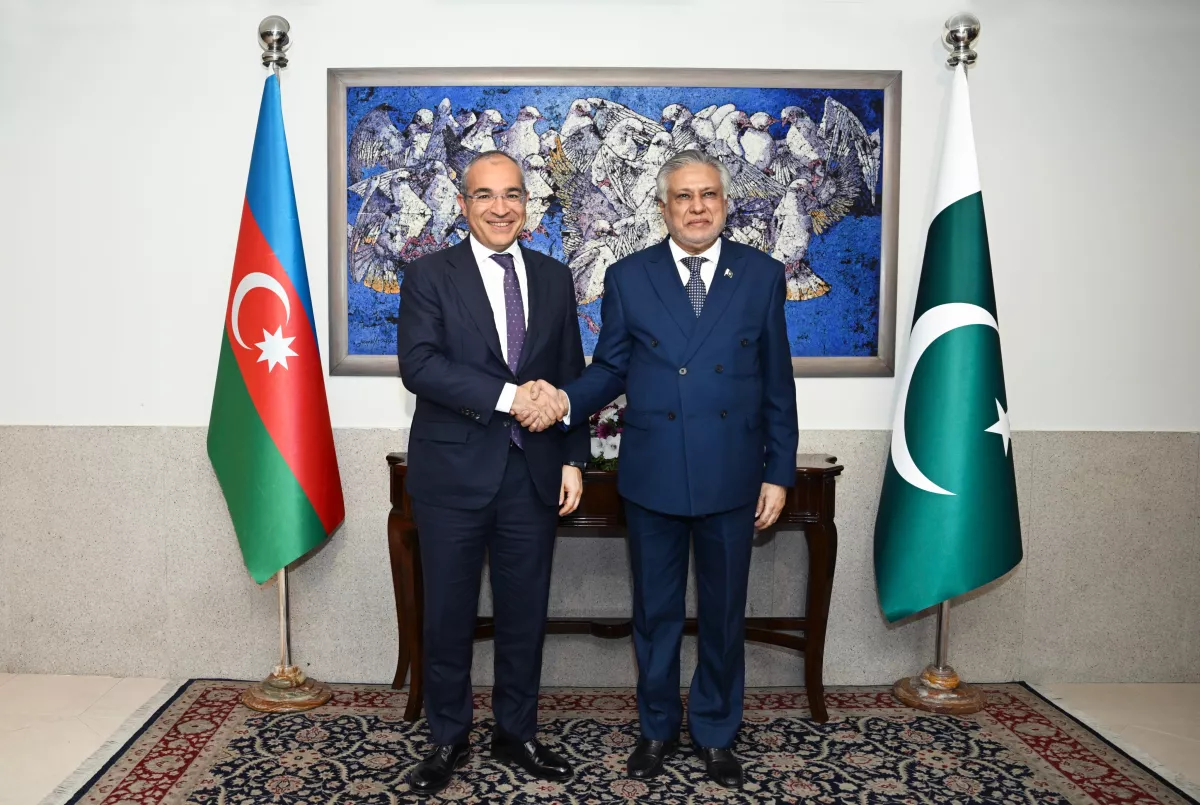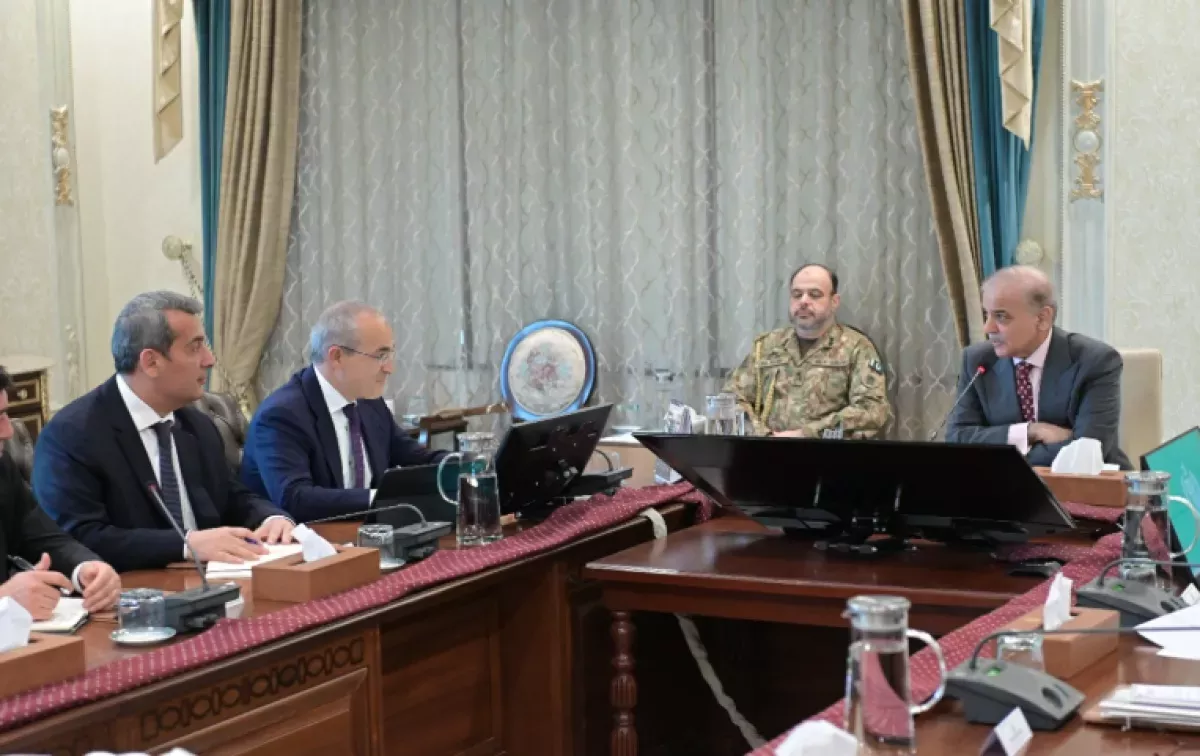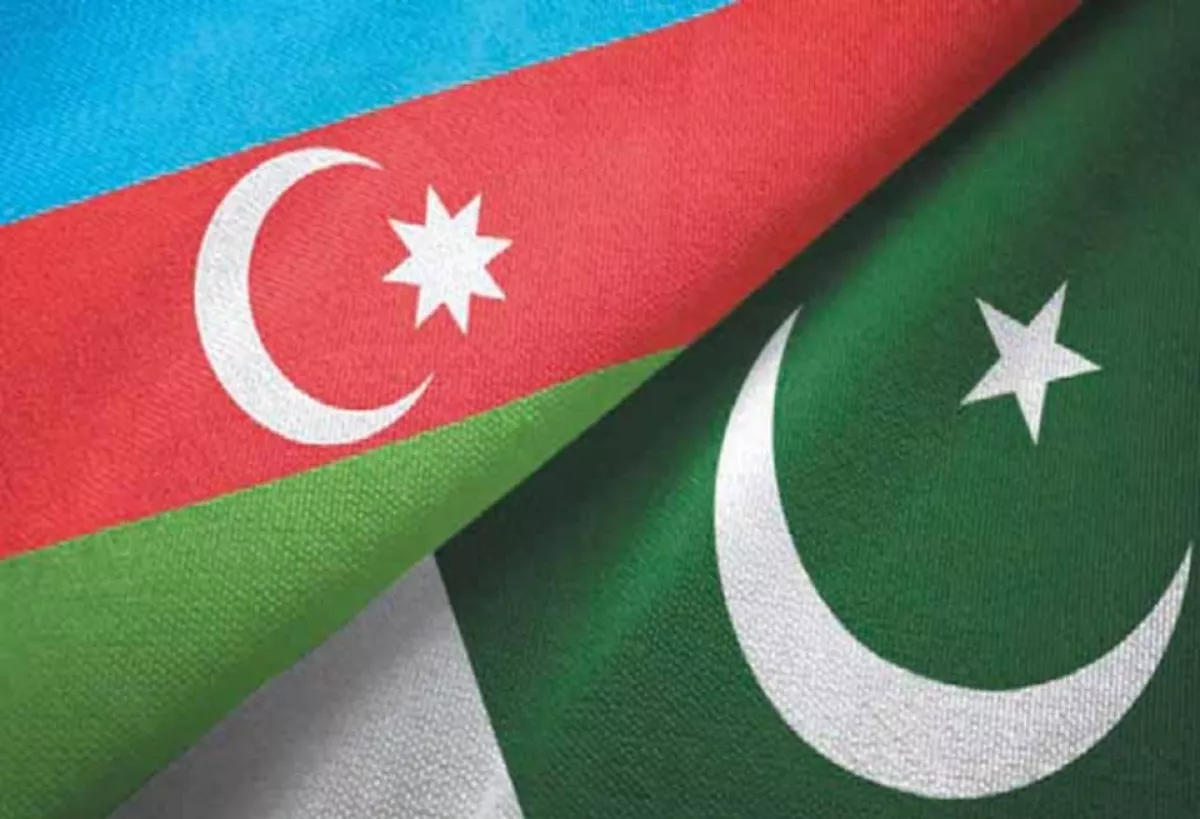Azerbaijan and Pakistan activate “turbo mode” in economic partnership From energy to IT
In recent years, economic and trade relations between Azerbaijan and Pakistan have been developing rapidly. The two friendly countries have made notable progress in energy and tourism, and have signed agreements on preferential trade and transit corridors. Building on this foundation, Baku and Islamabad aim to further increase trade turnover, promote investment projects in non-oil sectors, and expand cooperation in transport, logistics, and the defence industry.
During a recent meeting in Islamabad between Pakistani Prime Minister Shehbaz Sharif and Azerbaijani Minister of Economy Mikayil Jabbarov, both sides also discussed prospects for establishing a joint investment company on a parity basis, highlighting the growing ambition and strategic depth of their economic partnership.
Historically friendly relations between Baku and Islamabad have evolved into a strategic alliance, opening up qualitatively new opportunities for expanding mutual trade and shaping investment priorities. This progress is evident in the growing dynamics of bilateral trade: while Azerbaijan–Pakistan trade totalled $13.283 million in 2020, it surpassed $20.7 million in the first three quarters of 2025 — a 38.7% increase compared with the same period last year.
While this growth is solid, considering the GDP figures and untapped potential of both economies, the results remain modest. Pakistan’s projected GDP for 2025 is estimated at $411 billion, and with a population of 255.3 million, the country represents a substantial market. Meanwhile, Azerbaijan, with a population of ten million and an IMF-estimated GDP of nearly $79 billion by year-end, is also highly attractive for business initiatives, particularly in the non-oil sector.
“Within the framework of our visit to the Islamic Republic of Pakistan, we were pleased to meet with Mohammad Ishaq Dar, the Deputy Prime Minister and Minister of Foreign Affairs of Pakistan. We highlighted the prospects for advancing economic cooperation and discussed opportunities to expand joint activities in trade, energy, industry, transit, tourism, and other priority areas,” Jabbarov wrote on his X (formerly Twitter) page.

The minister also reported a productive meeting with the National Coordinator of Pakistan’s Special Investment Facilitation Council (SIFC), Lieutenant General Sarfaraz Ahmad: “We explored opportunities to expand mutual investments, including in the oil and gas sector, and promote joint projects, alongside active support for business partnerships.”
Opportunities for cooperation at the governmental level are considerable, in part due to the implementation of several intergovernmental agreements. In particular, productive ties have been established in the oil and gas sector: SOCAR Trading SA, a subsidiary of the State Oil Company of Azerbaijan, and its partner in Pakistan, Pakistan LNG Limited, are engaged in liquefied gas trade. SOCAR Trading SA also collaborates with Pakistan State Oil Company Limited on the supply of petroleum products.
This area is expected to expand gradually. According to Pakistan’s Cabinet of Ministers, during the meeting in Islamabad, Prime Minister Shehbaz Sharif encouraged leveraging the favourable investment opportunities in Pakistan’s oil and gas sector and welcomed SOCAR’s interest in the “White Oil Pipeline” project, which is intended to reshape regional energy dynamics and strengthen interconnections in key markets.

The two friendly countries have established stable cooperation in the defence industry, including in ammunition production and the supply of modern multirole JF-17C fighter jets to Azerbaijan. Pakistan has shown considerable interest in the potential of the Trans-Caspian Transport Corridor, and under the transit trade agreement (TTA) signed a year ago, both sides are exploring prospects for actively involving Pakistani carriers in transit multimodal freight routes.
Azerbaijan is also prepared to invest $2 billion in Pakistan’s economy, and concrete investment projects are currently being developed in areas such as road infrastructure, state asset privatisation, mineral resources and geology, information and communication technologies (ICT), and more.
Among the successful areas of the non-oil sector where the two countries have achieved the most significant breakthroughs is the recreational and tourism sector. Over the past two years, visa procedures have been simplified and digitised. In particular, Pakistan waived the e-Visa fee for Azerbaijani citizens, and the “Intergovernmental Agreement on Cooperation in Tourism between Azerbaijan and Pakistan” was approved.
A key role was also played by the significant increase in flights operated by Azerbaijan Airlines (AZAL) and Pakistan International Airlines (PIA) between major cities in the two countries — Baku, Islamabad, Karachi, and Lahore. As a result, 80,900 tourists arrived in Azerbaijan from Pakistan in 2024. This trend further increased over the first three quarters of 2025, with just under 70,000 Pakistani travellers visiting Azerbaijan, a 15% rise compared to the same period last year.
However, unlike the successful cooperation under intergovernmental agreements (G2G), joint Azerbaijan–Pakistan investment projects in the business-to-business (B2B) format remain largely limited to trade and intermediary operations. Over 3,000 Pakistani companies are registered in Azerbaijan, primarily operating in trade, catering, services, transport, and to some extent construction. Several Pakistani contracting firms have already applied to participate as contractors in reconstruction and restoration work in the Karabakh region.
Despite numerous business forums and missions, joint projects aimed at localizing light industry enterprises in Azerbaijan—particularly in the garment, textile, leather, and pharmaceutical sectors—have not yet been realised.
In this context, during a recent meeting in Islamabad, Azerbaijani Minister of Economy Mikayil Jabbarov highlighted opportunities for investment and cooperation in the dairy farming, hospitality, infrastructure construction, and ICT sectors, stressing the importance of completing the “Roadmap for Cooperation in Trade, Economy, Industry, and Investment for 2025–2028.” In the same vein, Prime Minister Shehbaz Sharif reaffirmed the proposal to establish a joint investment company with Azerbaijan on a parity basis to finance collaborative projects.

Among the sectors where Azerbaijan is most eager to accelerate the establishment of joint ventures is pharmaceuticals. Over the past fifty years, Pakistan has developed a robust pharmaceutical cluster, hosting hundreds of small “packaging” facilities as well as large-scale plants producing chemical and biological substances in-house. Collectively, these companies manufacture more than 30,000 drug formulations, a significant portion of which are exported.
In 2023–2024, active steps were taken to attract Pakistani pharmaceutical firms to Azerbaijan. Representatives of leading companies, including IBL Group, Searl, and Mercury ME DMCC, held negotiations with the Azerbaijani Ministry of Economy to explore investment opportunities and technology transfer aimed at localising pharmaceutical production within Azerbaijan.
A relatively new and highly promising area for establishing joint ventures is the IT sector. “Pakistan intends to invite Azerbaijan to participate in an auction to allocate 600 MHz of radio spectrum [...] Therefore, we would like to invite Azerbaijan's telecom industry to join the upcoming auction. We believe this is an excellent opportunity, as the country, with a population of 240 million, is rapidly digitising, and data usage is bound to grow,” recently stated Pakistan’s Minister of Information Technology, Shaza Fatima Khawaja.
The minister invited Azerbaijani startups to participate in joint incubation at eight national incubation centres managed by Pakistan’s Ministry of Information Technology, as well as in collaborative initiatives in cybersecurity, e-government, digital education (edtech), healthcare (healthtech), and fintech. Azerbaijan also has much to offer its partners in the e-government sphere: recently, in Baku, a Pakistani delegation held extensive discussions on implementing Azerbaijani experience and creating a model of the “ASAN Service” centre in Islamabad, with plans to expand to other regions of Pakistan.








